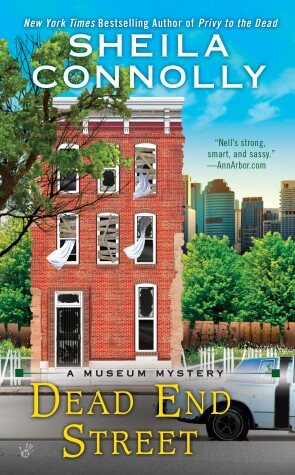
The New York Times bestselling author of Privy to the Dead returns to Philadelphia for more history—and a chilling mystery . . .
When the Pennsylvania Antiquarian Society discovers it owns some unique real estate, a deadly plot unfolds . . .
Society president Nell Pratt believes life is finally going her way. Everything’s running smoothly at work, and her love life is thriving. Then some unexpected news rocks her foundation. Two members of a local neighborhood rescue program, Tyrone Blakeney and Cherisse Chapman, inform Nell that her society owns an abandoned row house in a rundown area of Philadelphia and they insist on taking her to see the property before its date with the wrecking ball.
But soon after they arrive at the house, Cherisse is fatally shot and Tyrone is badly injured. The police believe it’s just random violence in a bad neighborhood, but Nell thinks there’s more to it and is determined to find answers before someone else becomes history . . .
To start bluntly: this author's writing irritates me. I've started and discarded two of her other series, because her MCs always come across belligerent and acerbic. This series is sadly no different, but I keep sticking with them because she so perfectly captures all the ins and outs of running a museum (at least, it seems so to a reader who has never actually run a museum). The stories are always interesting; enough to overcome my desire to throttle the MC.
Dead End Street, however, was not as good as the others. It's aim is to tackle a concept, rather than a specific object or setting in history. That concept is urban blight, neighbourhoods in decline, and neighbourhoods that have become urban war zones. Lofty subject matter, and she handles it pretty well, I think. Her approach from the standpoint of what role an historical society can play in rebuilding these neighbourhoods has a lot of merit. Unfortunately, Nell is abrasive and almost unlikeable, and she kept saying her desire to help was white man's guilt. Maybe her motivation is white man's guilt, but if so, it just makes her even less likeable - why can't she just want to participate in building up her city without the guilt? Anyway, ignore me, it was just one more thing I found irritating.
These aren't typical mysteries; they seldom revolve around dead bodies, and when they do - as this one does - Nell doesn't investigate or figure much out. Mostly it's about her being in the wrong place at the right time or vice versa, and putting facts together that make events clearer, although resolution usually comes of its own accord.
I say every time I read one of these books that I won't read any more of them, but then the next one comes out and I get sucked into wanting to spend time i the museum. So - who knows?
Reading updates
-
Started reading
-
28 May, 2017:
Finished reading
-
28 May, 2017:
Reviewed
